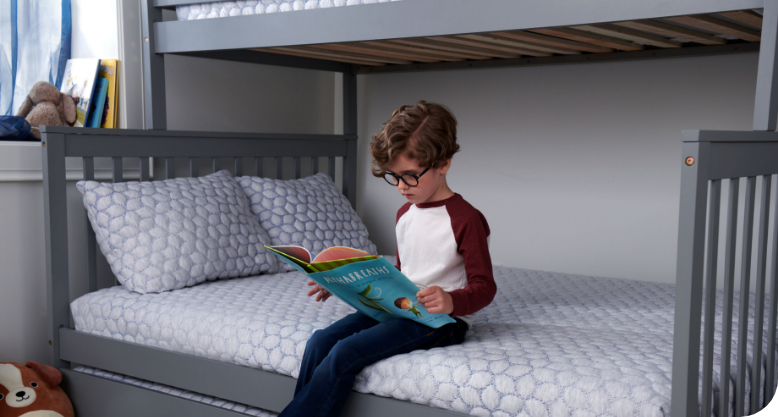7 Tips for Rocking the Holiday Season While Prioritizing Your Child’s Sleep
The holiday season is a magical time filled with family gatherings, festive lights and countless traditions. But for parents of young children, it can also be a challenging season to manage sleep schedules amidst all the festivities. With a little planning, you can make sure your child enjoys the holiday fun and gets the rest they need. Here are seven tips to help you prioritize sleep while still embracing the season's magic.
1. Stick to a Routine as Much as Possible
The holiday season can disrupt schedules with travel, late-night gatherings and days packed with holiday activities. However, sticking to your child’s normal sleep routine is one of the best ways to ensure they get the rest they need. While small adjustments are inevitable, focus on key elements of their regular bedtime ritual, like bath time, reading a book or dimming the lights before bed. If you’re traveling and staying in a hotel or a family’s spare bedroom, bring creature comforts from home (like blackout shades, white noise or their favorite pillow) in order to remind your child that it is time to sleep, even if they are not in their normal location.
Why It Works:
Children thrive on consistency, and a familiar routine helps signal to their brain that it’s time to wind down. This can make it easier for them to fall asleep even in an unfamiliar environment.


2. Schedule Events Around Nap Time
If your child still takes naps, protect those nap times as best you can. For instance, if a family gathering is planned for mid-afternoon when your child usually naps, consider arriving a bit later or leaving a bit early to work around their sleep schedule. If this is not possible, then offer your child their nap at the location of your event (either in the stroller, a guest bedroom or in someone's arms) to make sure they stock up on some sleep throughout the day.
Why It Works:
Missed naps can lead to overtiredness, which, ironically, can make it harder for children to sleep well at night. Sticking to regular naps whenever possible helps them stay well-rested and in a better mood, making holiday activities more enjoyable for everyone.
3. Plan for Time Zone Adjustments
If you’re traveling to a different time zone, “begin as you mean to go” on the first full day in your new location. Look at the clock and offer all sleep at your child’s “normal” times based on the clock in the new time zone. The quicker you get them back on their normal schedule, the more easily their bodies will adjust to the time change.
Why It Works:
Changing time zones can confuse the body’s internal clock, making it hard for children to sleep at appropriate times in a new time zone. Instead of adjusting them ahead of time, offering sleep in the new time zone will help them get used to the time change, so they’re ready to enjoy the holiday without feeling groggy or out of sorts.
4. Create a Sleep-Friendly Travel Environment
When you're traveling, bring along a few familiar items from home to create a comforting sleep environment. Your child’s favorite blanket, their white noise machine or even a small nightlight for your toddler can go a long way in helping your child settle in an unfamiliar place. If possible, try to give them a separate sleeping space so they can have a quiet, dark area for uninterrupted rest. Bring your pack and play or inflatable toddler bed to help create this separate space for your baby or toddler.
Why It Works:
Familiar objects provide a sense of security and can help soothe your child, making it easier for them to fall asleep in a new place. A consistent sleeping environment can make the difference between a night of tossing and turning and a peaceful slumber.
5. Communicate Boundaries with Family and Friends
The holidays are filled with love and family, but they’re also full of well-meaning relatives who might not fully understand the importance of your child’s sleep routine. Let family members know in advance when you’ll need quiet time for naps or bedtime. If you’re visiting someone’s home, politely request a quiet space for your child to rest. If your family is less-than-receptive to these accommodations, then it is okay to pivot and ask someone to snuggle with your baby to get them to sleep or take your toddler in the car for a drive, just to take the edge off.
Why It Works:
Setting clear expectations ahead of time helps avoid surprises and misunderstandings, making it easier to balance family togetherness with sleep needs. Most friends and family will understand, especially if they see it helps your child enjoy the time with them even more.


6. Prioritize Quality Over Quantity of Festivities
It can be tempting to pack in as many holiday activities as possible, but overloading your calendar can make it tough for children to get the rest they need and for you to enjoy the holiday events. Instead, prioritize the most important activities for your family and plan around them. Choose one or two high-quality experiences, like a tree-lighting ceremony or a visit to a holiday fair, and plan restful days between those events. Do not feel the need to go to every Winter Festival Breakfast with a Snowman…your kids won’t know the difference!
Why It Works:
Fewer activities mean less rushing and stress, allowing your child to engage more fully with each experience. When children are well-rested, they’re more likely to appreciate holiday events, creating those core memories we are all craving.
7. Be Flexible and Give Yourself Grace
It’s the holiday season, and things won’t always go perfectly. A late night here or a missed nap there is bound to happen. Instead of stressing, embrace the moment and enjoy the experience. Remember that a well-rested child can go to bed late and can skip a nap without throwing off their entire night. Focus on getting back to your routine after a busy day, but don’t be too hard on yourself if things don’t go according to plan.
Why It Works:
Flexibility reduces stress, which ultimately benefits both you and your child. If you let go of the expectation for perfection and adapt to changing circumstances, you’re modeling resilience and adaptability – two important skills for your child to learn.
How to Get Back on Track After the Holidays
Even with the best efforts, holiday schedules can disrupt regular sleep patterns. Once the holidays are over, focus on re-establishing your child’s routine as soon as possible. Here are a few tips to help reset their sleep schedule:
- Gradual Adjustments: Shift bedtime and wake-up times back to normal by 15-30 minutes each day.
- Wind-Down Time: Reinforce quiet, calm activities leading up to bedtime to help signal the end of a busy day.
- Limit Stimulation: After the holidays, cut back on screen time, sugar and overly stimulating activities in the evening to encourage deeper sleep.


Making Holiday Magic and Resting Well
The holidays are a special time, and it’s natural to want to make them memorable for your child. By keeping their sleep needs in mind and incorporating these strategies, you can help them stay well-rested, happy and ready to make the most of the season’s festivities. With a little planning and a focus on balance, you can rock the holiday season while ensuring that your child gets the rest they need to thrive.
Remember, it’s not about having the “perfect” holiday – it’s about creating happy, healthy memories together. Here’s to a restful and joyful holiday season for you and your family!
If your child is not yet an independent sleeper and over the age of 4 months old, now is the best time to work on their sleep ahead of the busiest part of the holiday season. Sleep will make everyone jollier! Reach out to me for more information on my sleep programs.

 Baby
Baby

 Kids
Kids

 Learn
Learn

 FIND A STORE
FIND A STORE CONTACT
CONTACT



